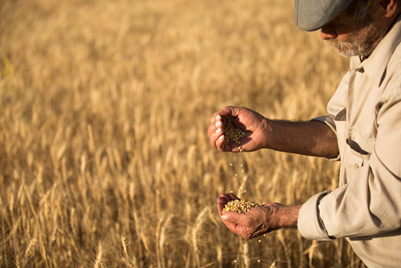return to Seed Program main page
What can you do with the seed that you purchase?
Many companies and universities have invested in the development of new breeding material. These entities have several options for protecting their investments in intellectual property. Varieties can be protected by the Plant Variety Protection Act including Title V protection for certified seed. In addition licensing agreements and utility patents may also protect traits present in specific varieties.
- Is the variety protected?
- Does it contain patented genetic material?
- Is it required to be a class of certified seed?

These are questions sellers must answer before attempting to market seed and what buyers should know so that they look for it in the labeling. Many popular varieties of agricultural crops are protected by the Plant Variety Protection Act (PVPA). This means that seed of these varieties cannot be sold without authorization of the owner of the variety. The PVPA provides farmers with the “right to save seed” to plant on their own farm. Prior to 1994, a farmer could either sell that amount or use it themselves. As a result of amendments to the PVPA in 1994 and related U.S. Supreme Court decisions in 1995, a farmer can no longer legally sell seed of a variety that was protected by PVPA after 1994.
Some PVPA protected varieties must be sold as a class of certified seed. In addition to the required seed labeling, these varieties must also have documentation of their certified status to be legally sold in Minnesota. The documentation is either a blue, purple, or white certification tag for bagged seed or a bulk certificate. The Minnesota Crop Improvement Association (MCIA) is the designated seed certification agency for Minnesota. MCIA is the only agency that can certify seed produced here. Seed brought in from another state may have been certified by the designated agency of the state where it was produced. That certification is also accepted here.
Many varieties of seed are covered by a federal plant patent because they contain genetic material that is patented or they were developed using a patented process. In either case, no one can legally sell seed of these varieties without the permission of the owner. The seed label usually contains a notice of the patent and a warning against unauthorized sales of seed of the variety. The seed producer legally selling a patented variety has been licensed by the owner to produce and sell the seed in exchange for royalties.
Misrepresentation of seed as being certified when it is not, or the sale of non-certified seed of a protected variety that must be certified are serious violations of both Minnesota and Federal law. Violation of the PVPA or a plant patent deprives the owner of the variety of their rightful royalties. The owner of the protected or patented variety may, and probably will, sue violators and can be awarded damages of up to three times the royalty plus legal costs. Damages may be sought against the actual seller as well as anyone who assisted in the illegal sale.

